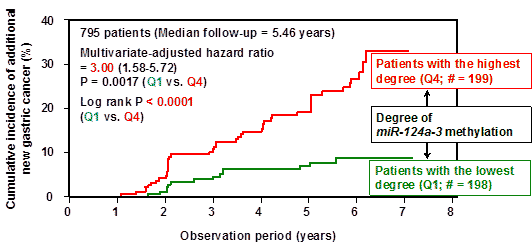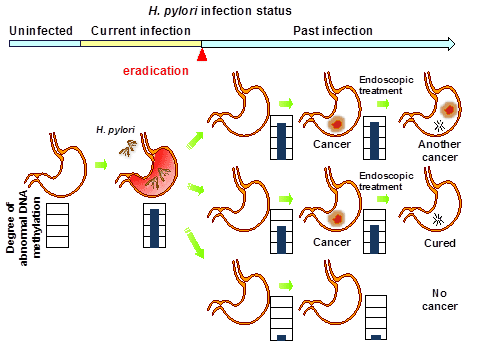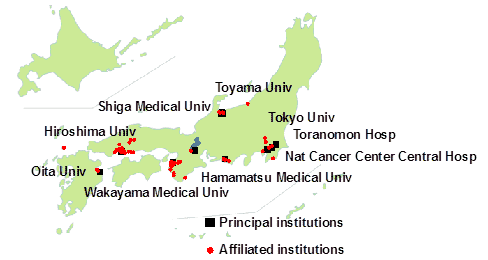Home > Information > press release > New Risk Diagnosis Technique for Additional Gastric Cancer After Endoscopic Curative Treatment of A Gastric Cancer
New Risk Diagnosis Technique for Additional Gastric Cancer After Endoscopic Curative Treatment of A Gastric Cancer
December 21, 2016
National Cancer Center of Japan
Japan Agency for Medical Research and Development (AMED)
in Japanese
Essentials
- The research team developed a new technique to predict the risk of developing additional gastric cancer after endoscopic curative treatment of a gastric cancer by measuring the degree of abnormal DNA methylation in normal gastric mucosae.
- Patients with the highest degree of abnormal methylation had three times as high a risk as those with the lowest degree.
- This new strategy of risk diagnosis can be applied to healthy people after H. pylori eradication, and is potentially applicable to other types of cancers.
The clinical study was conducted by a research team of the Division of Epigenomics (Chief Toshikazu Ushijima and Dr. Masahiro Maeda), National Cancer Center Research Institute; Endoscopy Division (Dr. Ichiro Oda and Dr. Takeshi Nakajima), National Cancer Center Hospital; Department of Gastroenterology, University of Tokyo; and Second Department of Internal Medicine, Wakayama Medical University. The research team analyzed the degree of abnormal DNA methylation in normal gastric mucosae of gastric cancer patients curatively treated by endoscopy, and followed 795 patients for five years. As a result, patients with the highest degree of abnormal DNA methylation were shown to have three times as high a risk of developing an additional new gastric cancer as those with the lowest degree.
Infection by Helicobacter pylori (H. pylori) is known as a definite cause of gastric cancer. H. pylori infection induces abnormal DNA methylation, along with mutations, in gastric mucosal cells, and these abnormalities will remain even after eradication of H. pylori. This is why, even after curative removal of a gastric cancer by endoscopy, additional new gastric cancers can develop from the remaining stomach with a high incidence (2.0-2.5 % per year). However, it has been almost impossible to predict who will develop gastric cancer after endoscopic curative treatment of a gastric cancer.
The research result was published in one of the two top journals in gastroenterology "GUT" on December 21, 2016.
The research team is now conducting another prospective clinical study to predict the risk of developing a gastric cancer in healthy people who received H. pylori eradication, supported by AMED. This ongoing study is expected to contribute to personalized cancer screening depending upon individual's risk, to early detection and treatment of gastric cancer, and to reduction of healthcare costs. In addition, the approach established now is expected to be useful for other types of cancers, such as liver cancer and colon cancer associated with ulcerative colitis.
Research Methods and Results
The research team analyzed the degree of abnormal DNA methylation using three genes in normal gastric mucosae obtained by biopsy in 826 patients whose gastric cancer was curatively removed using endoscopy. The patients were followed-up by annual check-up using gastric endoscopy, and 133 of 795 patients who completed a 5-year follow-up developed an additional new gastric cancer. Especially, 116 patients developed gastric cancers after one year of enrollment, which were considered to be unequivocally additional new gastric cancers (authentic additional new gastric cancer). Patients were classified into four groups according to the degree of abnormal methylation of one of three genes (miR-124a-3、EMX1、NKX6-1). The group with the highest degree of abnormal methylation of the miR-124a-3 gene had three times as high a risk of developing an additional new gastric cancer as those with the lowest degree (Figure 1). The results obtained using the other two genes were quite similar.This study demonstrated that cancer risk diagnosis can be achieved by measuring the degree of abnormal methylation in normal tissues. At the same time, gastric cancer patients with the lowest degree still had a risk of developing an additional new gastric cancer, and needs annual screening.

Figure 1 Cumulative incidences of authentic additional new cancers according to the degree of abnormal methylation
The Y-axis shows the incidence of authentic additional new gastric cancers, and the X-axis shows the observation period. The patients were classified into four groups according to the degree of abnormal methylation. The patients with the highest degree of abnormal methylation of the miR-124a-3 gene had three times as high a risk of developing an additional new gastric cancer as those with the lowest degree after taking account of other risk factors - hospital, gender, age, pepsinogen index, history of endoscopic submucosal dissection, smoking, and green vegetable intake.What is abnormal DNA methylation?
DNA methylation itself is a physiological mark on DNA, known as an epigenetic modification, and labels genes used and not used in a cell. Abnormal DNA methylation can mistakenly label a gene as "not to be used", and the gene is inactivated even though its genetic code itself is intact. Since abnormal DNA methylation remains for life, it can become a cause of a cancer.In our life, we may be exposed to H. pylori infection, and, if so, the infection induces abnormal DNA methylation in our gastric mucosal cells. H. pylori eradication can reduce cells with abnormal methylation, but stem cells with abnormal methylation will remain for life. The research team has discovered that the degree of the remaining abnormal methylation is closely associated with cancer risk (Figure 2).

Figure 2 H. pylori infection and abnormal DNA methylation in gastric mucosae
The research team previously showed that normal gastric mucosae without H. pylori infection have almost no abnormal methylation, that, if infected with H. pylori, a high degree of abnormal methylation is induced, and that, by eradication of H. pylori, the degree ameliorates. People with a low degree have low risk of developing gastric cancer while people with a high degree have a high risk. Those with a very high degree of abnormal methylation are associated with multiple occurrence of gastric cancer.What's next?
The results conclusively showed that measurement of the degree of abnormal DNA methylation in normal tissues has a high potential for precision cancer risk diagnosis. Another prospective study to predict gastric cancer risk in healthy people who received H. pylori eradication is now being conducted based upon a nationwide network of 66 participating institutions (Figure 3). Once this ongoing prospective study yields a definitive result, it is expected to lead to optimization of screening intervals depending upon an individual's precise cancer risk, and to early detection and treatment of gastric cancer. All these are expected to reduce the burden of those screened and healthcare costs.Abnormal DNA methylation is also important for other types of cancers, especially those associated with chronic inflammation, such as liver cancers associated with the hepatitis viruses and colon cancer associated with ulcerative colitis.

Figure 3 Sixty-six institutions nationwide participating in the ongoing prospective study
The research team is now conducting another prospective study to predict gastric cancer risk in healthy people who received H. pylori eradication based upon a nationwide network of 66 participating institutions (9 principal and 57 affiliated institutions). This study is expected to lead to optimization of screening intervals depending upon individual's precise cancer risk.The paper published
| Journal | Gut |
|---|---|
| Title | High impact of methylation accumulation on metachronous gastric cancer: 5-year follow up of a multicentre prospective cohort study |
| Authors |
Masahiro Maeda, Takeshi Nakajima, Ichiro Oda, Taichi Shimazu, Nobutake Yamamichi, Takao Maekita, Kiyoshi Asada, Chizu Yokoi, Takayuki Ando, Takeichi Yoshida, Sohachi Nanjo, Mitsuhiro Fujishiro, Takuji Gotoda, Masao Ichinose, Toshikazu Ushijima |
|
DOI |
10.1136/gutjnl-2016-313387 |
Research Fund
- The National Cancer Center Research and Development Fund (H26-A-15)
- The Practical Research for Innovative Cancer Control from the Japan Agency for Medical Research and Development (AMED) (16ck0106023h0003)
Press release
New Risk Diagnosis Technique for Additional Gastric Cancer After Endoscopic Curative Treatment of A Gastric CancerRisk Detection in Healthy People after H. pylori Eradication is Ongoing
Inquiries
From Media-
Office of Public Communication, National Cancer Center
Phone: +81-3-3542-2511
E-mail: ncc-admin[at]ncc.go.jp (Please replace [at] to @.) -
The Japan Agency for Medical Research and Development (AMED)
Phone: +81-3-6870-2221
E-mail: cancer[at]amed.go.jp (Please replace [at] to @.)
Dr. Toshikazu Ushijima, National Cancer Center Research Institute
Phone: +81-3-3542-2511
E-mail: ncc-admin[at]ncc.go.jp (Please replace [at] to @.)
